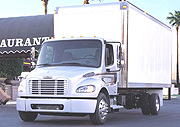PAULUS KAYIGGWA discovers how much private companies charge to have your products moved from Mombasa to Kigali As a land locked country, Rwanda’s traders incur high transport costs from Mombasa or Dar es Salaam to Kigali. According to Pana Nzaramba, the Transport Manager of Coimex transporters and forwarding company, most transporting companies in Kigali don’t own trucks needed to move traders’ commodities. Instead, they heavily rely on Kenyan, Tanzanian and Ugandan transporters-who in turn double the costs.


PAULUS KAYIGGWA discovers how much private companies charge to have your products moved from Mombasa to Kigali
As a land locked country, Rwanda’s traders incur high transport costs from Mombasa or Dar es Salaam to Kigali. According to Pana Nzaramba, the Transport Manager of Coimex transporters and forwarding company, most transporting companies in Kigali don’t own trucks needed to move traders’ commodities. Instead, they heavily rely on Kenyan, Tanzanian and Ugandan transporters-who in turn double the costs.
"We don’t have enough commodity transporting Trucks, we corroborate with our partners in Dar es Salaam to transport our customer’s goods to Kigali,” Nzaramba said in an interview Wednesday.
Other partners in the transport companies include; Coimex, African Trans handling goods from Europe and Arop trading and transport company handling goods from Asia and China.
"We work as an intermediary transporters company. When customers send or bring to us clearing papers, we send them to our transport partners in Dar es Salaam,” he said. In the East African Community (EAC), our partners are based only in Dar es Salaam.
"We used to have partners even in Mombasa but they were not cooperative, and importers prefer to use Dar es Salaam port because the distance is shorter than Mombasa,” explained Nzaramba.
A container full of goods from Dar es Salaam, is charged $6800 to be transported to Magerwa and clearance of bond fee at Lusumu border.
"Coimex takes $600, fuel and clearance consumes $4200 and the transporting company takes $2000 as their profits.”
Frank Mukisa a driver of trans com transporters limited said that unstable fuel prices on the world market make transport costs unaffordable not only in transporting goods but also in tax services.
"In October last year, a 40 feat container used to cost $5700, in January it was $6300 and since April to date it was costing $6800 a trend that has also pushed prices upward on goods,” he explained.
He further added that the coastline officials have also made things a bit tough; they charge transporters an extra tracks coastline operation fee of $ 150 which wasn’t the case e previously.
"As a result, we calculate it also and add it to transport charges we get from importers.”
Mukisa revealed that transporters also charge for the delays they encounter as result of regional bureaucratic obstacles such as cumbersome trans-border customs procedures, clearing, cargo inspections and corruption along some border posts.
"The more a transporter expects to delay along the way and the border post, the higher the cost of transport charged from an importer,” he said.
Joseph Ntambara, an importer said that transporting of goods from Dubai to Kigali is expensive. It involves long distances and closing numerous border posts which involve different crosschecking.
"I used to pay emirates sea fleet transport company a fee of $8,000 for a 40 fit container from Dubai to Kigali but now I pay $11,000 for the same distance,” he said.
Ntambara further claimed that though transport companies have a right to charge any fee, it is unrealistic to transport goods from Mombasa to Kigali at a cost of $7000, yet same goods from Mombasa to Antwerp in Belgium cost only $1400.
"I think we are being exploited by transporters,” he said.
Ends


